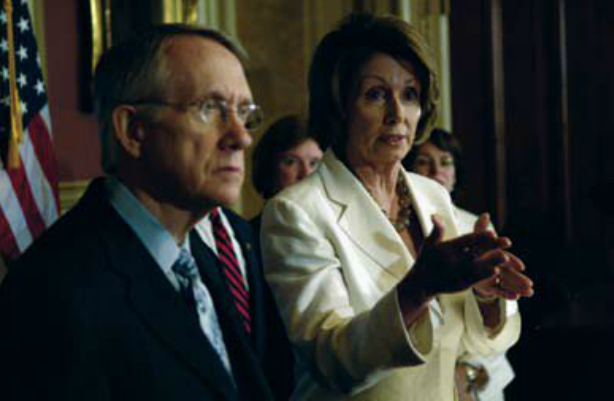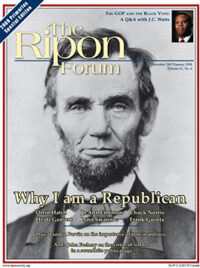by WILLIAM CONNELLY
Congress has been called the “broken branch” of our government. But is it still broken now that Democrats hold the majority on Capitol Hill?
Are Democrats in the House and Senate behaving as a responsible, governing party effectively legislating policy in the national interest? Or are they instead being merely responsive to their liberal base, intent upon playing the politics of opposition to President Bush, thereby inviting gridlock?
Clearly, majority Democrats have shown discipline in keeping the legislative trains running as witness the legislative productivity numbers they publicize. Upon regaining the majority in the 2006 election Democrats promised “an end to the two-day work week,” substituting a Monday through Friday schedule for the supposedly lackadaisical Tuesday through Thursday Republican schedule.
By the end of this October, Democratic leaders could brag about their approximately 150 days in session and 1200 hours hard at work. Most noteworthy perhaps, the 110th Congress eclipsed the voting pace of any previous Congress with a record 1,000 roll call votes by late October, something, The Washington Post intoned, had “never before achieved in a single year in the history of recorded House votes.” Indeed, when measured by roll call votes, Congressional Democrats have succeeded in outpacing the productive first year of the Gingrich-led “House Republican Revolution” in 1995 and the famously energetic “Watergate Baby” first year Democratic majority in 1975.

By the end of this October, Democratic leaders could brag about their approximately 150 days in session and 1200 hours hard at work.
On the face of it, that’s quite an accomplishment. Unfortunately, while statistics such as these are useful measures of congressional workload, they fail to fully capture legislative productivity, including the impact of legislation on people’s lives.
For instance, by August 1, 1996, the House had cast only 397 votes (compared to 790 this year), but it had also approved a landmark bill to reform the nation’s welfare system, along with measures to improve health care (PL 104-191) and strengthen retirement security (PL 104-121). Similarly, during the first year of “united Republican government” under President Bush in 2001, the House had cast only 318 votes, yet it had also approved the largest tax cut in a generation and the No Child Left Behind Act.
What do Congressional Democrats have to show for their days and hours at work and all their roll call votes this session? Early in the 110th Congress, Speaker Pelosi touted the legislative accomplishments of her first 100 hours. These accomplishments included passage of legislation to raise the minimum wage, reform lobbying and ethics laws, improve veterans benefits and college loans, and implement the 9/11 Commission recommendations. They were also part of the Democrats’ Six for ’06 campaign agenda. But according to one expert quoted in Congressional Quarterly, they also amount to “very small potatoes.” Meanwhile, on the big issues like Iraq, immigration and health care, Democrats have little to show for their efforts. Instead, the naming of courthouses and post offices accounts for almost half of the bills signed into law this year. In addition, Congressional Democrats are further behind in completing the budget process than at any time since 1987.
Poll numbers are another way of gauging legislative success. Unfortunately, Congress’ poll numbers suggest Democrats’ bragging rights may be limited. Congressional Quarterly reports Congress currently suffers from “rotten reviews.” In August, Congress’ job approval rating tied the historic low of 18 percent in 1992 – when Democrats last ran Congress. CQ recently concluded that “plummeting poll numbers put Congress in a bind, threatening to continue the very paralysis and partisanship that got them there in the first place.”
Unfortunately, while statistics such as these are useful measures of congressional workload, they fail to fully capture legislative productivity, including the impact of legislation on people’s lives.
Paralysis and Partisanship?
Surely Democrats do not deserve all the blame for paralysis and partisanship, anymore than Republicans deserved all the blame they received for the same prior to the 2006 midterm elections. After all, it takes two to tango. It takes two parties, two chambers and two branches to legislate.
Democrats deserve neither all the blame, nor all the credit, for paralysis and partisanship. Credit? Certainly. Low poll numbers do not represent monolithic disgust with the meager legislative productivity of Congressional Democrats. Some of the “rotten reviews” reflect voters who are not at all interested in advancing Democratic legislative ambitions. Indeed, the low poll numbers may be one measure of a lack of consensus in America on some of the difficult issues confronting Congress and the President.
When confronted with a lack of consensus should Congress legislate? If the active production of legislation is the sole measure of a good Congress, then the quantifiable measures of productivity listed above – hours, days, votes – are just the ticket. However, such a perspective presumes, as Democrats often do, that good government is activist government.
Congress scholar Charles O. Jones argues that governing may include halting legislative productivity. What if gridlock is governing? Jones notes “the prevention of legislation may also represent effective governance.” At times the status quo may be an improvement over legislative change. (Who has not agreed with this observation at one time or another?) Republicans believe good government means limited government.
The idea that Congress is meant to be a lean, mean legislative machine constantly cranking out legislation ignores the fact that Congress is also meant to be representative and deliberative. The Founders purposely did not design Congress to act with energy and dispatch; rather, they meant Congress to be broadly representative and deliberative. Congress should represent the diversity of the nation, including when consensus is lacking. At all times, Congress should deliberate carefully and forcefully. As I. M. Destler notes, the genius of Congress is democracy, diversity and debate.
Sans consensus, should Congress act? Or should Congress as a deliberative institution exercise its responsibility to promote public deliberation to educate citizens about public policy? Contentious debate and polarizing partisanship help sharpen the issues, providing voters with a choice, not just an echo.
Partisan polarization is not new, and bipartisan responsibility for partisan rancor is hardly surprising. Partisanship is both good and bad. Partisanship sometimes diverts Congress from more serious issues and hinders the day-to-day legislative work preventing compromise. But friction creates light as well as heat. In the words of Frederick Douglass: “If there is no struggle there is no progress. Those who profess to favor freedom and yet deprecate agitation, are men who want crops without plowing up the ground, they want rain without thunder and lightning.”
Our Constitution invites “the spirit of party” and constructive partisanship, including often cacophonous, cantankerous partisanship. The principled differences between our two great parties – whether over the Iraq War or SCHIP – matter, and should be given voice.
Scholar Jeremy Waldron underscores a major purpose of lawmaking in a democracy, namely, that of displaying disagreement: “Legislation is the product of a complex deliberative process that takes disagreement seriously and that claims its authority without attempting to conceal the contention and division that surrounds its enactment.”
Paralysis and partisanship may be productive. Perhaps we need to lower public expectations of Congress and government. Members need to spend time on the Hill and at home with constituents.
Limited government is good government, especially in response to public sentiment.
William F. Connelly, Jr. is the John K. Boardman Politics Professor at Washington and Lee University in Lexington, Virginia.




